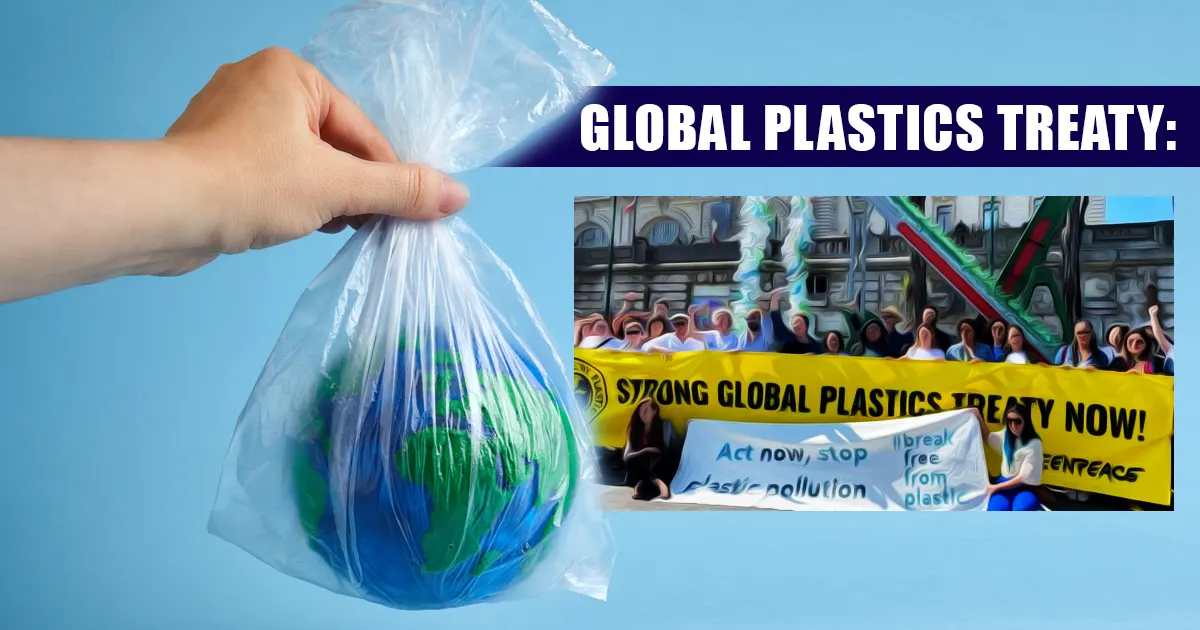
Context
The upcoming Intergovernmental Negotiating Committee (INC-5) session in Busan, South Korea (Nov 25–Dec 1, 2024), focuses on formulating a legally binding treaty to address plastic pollution. The treaty aims for a holistic lifecycle management of plastics, ensuring health, environmental protection, and equity for informal waste workers.
The Plastic Crisis: Scale and Impact
- Global Plastic Waste Production (OECD, 2022):
- 2019: 353 million tonnes of plastic waste, more than double the amount in 2000.
- Projection for 2060: Expected to triple.
- Recycling and Disposal Gaps:
- Recycled: Only 9% of waste.
- Landfilled: 50%.
- Incinerated: 19%.
- Uncontrolled Disposal: 22%.
- Environmental Impacts:
- Soil Pollution: Reduces fertility, affecting agriculture.
- Marine Pollution: Disrupts ecosystems and harms aquatic life.
- Climate Resilience: Compromised by ecosystem degradation.
- Health Impacts:
- Microplastics Hazard: Ingestion by humans and animals leads to serious health issues.
- Chemical Leaching: Release of BPA and phthalates into food and water, causing endocrine disruptions.
- Community Health Risks: Exposure to toxic emissions in plastic production areas, especially affecting vulnerable populations.
- Global Inequity:
- Low-income countries, particularly in South Asia, disproportionately handle imported plastic waste, facing toxic exposure and environmental degradation.
Need for a Global Plastics Treaty
- Lifecycle Impact of Plastics:
- Plastics release hazardous endocrine-disrupting chemicals (EDCs) like PFAS throughout their lifecycle, affecting ecosystems and human health.
- Disproportionate Burden:
- Low-income nations bear the brunt of managing excessive plastic waste imports without adequate resources.
- Inclusion of Informal Workers:
- Organizations like the International Alliance of Waste Pickers (IAWP) advocate for integrating informal waste collectors into policy discussions.
- Polluter Responsibility:
- Enforcing the “polluter pays” principle to ensure accountability for environmental and health impacts.
Advantages of a Holistic Global Approach
- Health and Environmental Protection:
- Mitigates harm from plastic production, disposal, and chemical exposure.
- Global Accountability:
- Encourages responsible manufacturing and sustainable waste management practices.
- Multi-Stakeholder Collaboration:
- Promotes partnerships between governments, industries, civil society, and affected communities.
Challenges to Implementation
- Enforcement Issues:
- Regulating multinational corporations and ensuring compliance across nations.
- Economic Resistance:
- Industries reliant on plastics may oppose stringent regulations, citing economic and employment concerns.
- Support for Vulnerable Regions:
- Low-income regions may lack financial and technological resources for effective plastic waste management.
Way Forward
- Global Legal Framework:
- Develop a binding framework to regulate hazardous chemicals in plastics and ensure protections for vulnerable populations, particularly women and children.
- Reduce Single-Use Plastics:
- Governments should commit to phasing out single-use plastics and invest in eco-friendly alternatives.
- Inclusive Policy-Making:
- Incorporate diverse stakeholders, including informal workers, non-profits, industry leaders, and environmental experts.
- Support for Vulnerable Regions:
- Provide financial aid and pollution control technologies to regions disproportionately affected by plastic waste imports.
- Extended Producer Responsibility (EPR):
- Rethink EPR norms to integrate informal waste collectors into the waste management system, ensuring fair compensation and job security.




